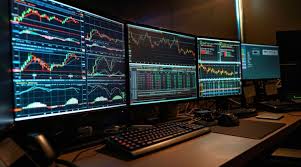Proprietary trading, often shortened to “prop trading,” plays a pivotal role in shaping the dynamics of global financial markets. Large financial institutions and specialized trading firms engage in proprietary trading to invest their own capital, rather than on behalf of clients. By doing so, they aim to secure substantial profits by leveraging market inefficiencies, arbitrage opportunities, or predictive strategies. While often operating behind the scenes, proprietary trading has a profound effect on market liquidity, volatility, and efficiency, shaping how modern financial markets function.
What Exactly Is Proprietary Trading?
At its core, proprietary trading refers to financial institutions or businesses using their own funds to conduct trades in various financial instruments. These instruments might include stocks, bonds, commodities, currencies, or derivatives. Prop trading strategies are often backed by advanced technologies, complex algorithms, and highly skilled traders who employ data-driven techniques to predict market movements and identify profitable opportunities.
Unlike traditional brokerages, whose main revenues come from commissions for facilitating trades on behalf of clients, proprietary trading firms focus solely on generating returns through activities funded by their own balance sheet. This high-stakes approach offers significant profit potential, but it also exposes firms to heightened risks.
Enhancing Market Liquidity and Efficiency
By its very nature, proprietary trading contributes significantly to market liquidity. Liquidity refers to how easily an asset can be bought or sold without drastically affecting its market price. Proprietary traders are known for executing a high volume of trades, injecting much-needed liquidity across multiple sectors of the financial markets. Increased liquidity ensures smoother transactions for other market participants, including retail and institutional investors.
Furthermore, the activities of proprietary traders can enhance market efficiency. Because proprietary firms analyze and act on discrepancies in asset prices across different markets, they help correct price inefficiencies. For example, arbitrage trading strategies exploit minor differences in asset prices between two exchanges. When proprietary traders identify and act on these opportunities, they effectively equalize prices, ensuring the market functions more fairly and efficiently.
Impact on Market Volatility
Despite these benefits, proprietary trading can also influence market volatility. Since proprietary firms operate at scale and execute large transactions, their movements can sometimes lead to price fluctuations. For instance, algorithmic trading executed by proprietary desks can amplify sudden shifts in asset prices when market conditions are unstable. Flash crashes, which refer to rapid and deep drops in asset prices, are often attributed to such trading activities.
Some argue that this increased volatility can harm small investors, who may not have the resources to respond quickly to significant market changes. Proprietary trading firms, however, advocate that volatility is an inherent feature of vibrant markets, providing opportunities for informed trading and investment strategies.
Proprietary Trading in a Globalized Economy
Proprietary trading is highly globalized and interconnected in today’s financial landscape. Firms operating in multiple markets can take advantage of differences in market structures or regulatory environments. For example, a firm conducting currency trades in both the U.S. and European markets can capitalize on time zone differences or varying interest rate trends.
Additionally, emerging technologies like artificial intelligence and machine learning have enabled proprietary firms to scan global markets almost instantaneously, identifying opportunities in ways that were unimaginable just a decade ago. This global reach not only maximizes profits but also reinforces proprietary trading’s critical role in shaping modern financial systems.
A Balancing Act in Financial Markets
Although proprietary trading is often viewed with a mix of admiration and skepticism, its importance in global financial markets cannot be overstated. By improving liquidity and achieving pricing efficiency, prop traders contribute to the system’s overall health. At the same time, the potential for increased volatility highlights the need for a delicate balance between leveraging opportunities and maintaining market stability.
Ultimately, proprietary trading reflects the fast-paced and interconnected nature of global finance, showing no signs of slowing down in the years to come. Whether through advanced technology or age-old market instincts, proprietary trading remains at the forefront of modern financial innovation.



